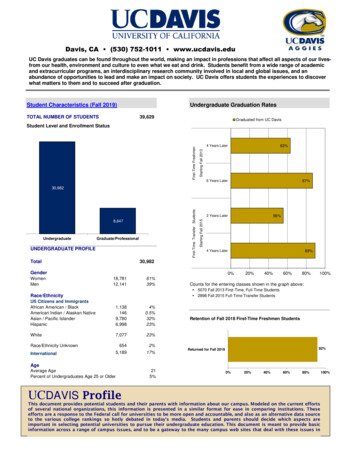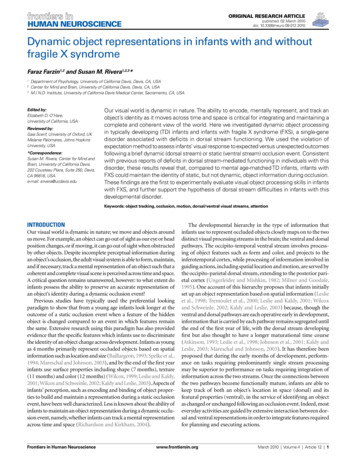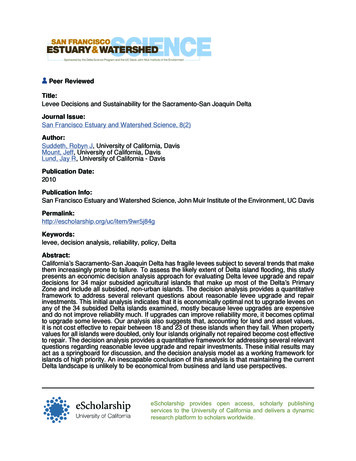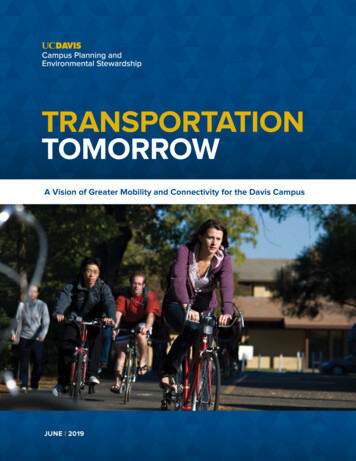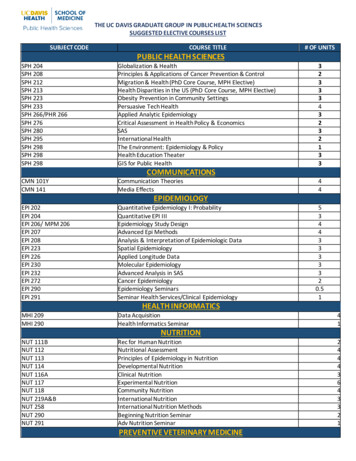
Transcription
THE UC DAVIS GRADUATE GROUP IN PUBLIC HEALTH SCIENCESSUGGESTED ELECTIVE COURSES LISTSUBJECT CODECOURSE TITLE# OF UNITSPUBLIC HEALTH SCIENCESSPH 204SPH 208SPH 212SPH 213SPH 223SPH 233SPH 266/PHR 266SPH 276SPH 280SPH 295SPH 298SPH 298SPH 298Globalization & HealthPrinciples & Applications of Cancer Prevention & ControlMigration & Health (PhD Core Course, MPH Elective)Health Disparities in the US (PhD Core Course, MPH Elective)Obesity Prevention in Community SettingsPersuasive Tech HealthApplied Analytic EpidemiologyCritical Assessment in Health Policy & EconomicsSASInternational HealthThe Environment: Epidemiology & PolicyHealth Education TheaterGIS for Public HealthCMN 101YCMN 141Communication TheoriesMedia I 202EPI 204EPI 206/ MPM 206EPI 207EPI 208EPI 223EPI 226EPI 230EPI 232EPI 272EPI 290EPI 291Quantitative Epidemiology I: ProbabilityQuantitative EPI IIIEpidemiology Study DesignAdvanced Epi MethodsAnalysis & Interpretation of Epidemiologic DataSpatial EpidemiologyApplied Longitude DataMolecular EpidemiologyAdvanced Analysis in SASCancer EpidemiologyEpidemiology SeminarsSeminar Health Services/Clinical Epidemiology53443333320.51HEALTH INFORMATICSMHI 209MHI 290Data AcquisitionHealth Informatics Seminar41NUTRITIONNUT 111BNUT 112NUT 113NUT 114NUT 116ANUT 117NUT 118NUT 219A&BNUT 258NUT 290NUT 291Rec for Human NutritionNutritional AssessmentPrinciples of Epidemiology in NutritionDevelopmental NutritionClinical NutritionExperimental NutritionCommunity NutritionInternational NutritionInternational Nutrition MethodsBeginning Nutrition SeminarAdv Nutrition SeminarPREVENTIVE VETERINARY MEDICINE24443643321
MPM 210Advanced Health Leadership2SOCIOLOGYSOC 145ASOC 160SOC 185YSOC 201Sociology of Third World DevelopmentEnvironmental SociologySocial Policy (Hybrid)Social ResearchSTA 106STA 108Analysis of VarianceRegression Analysis4444STATISTICS44OTHER ELECTIVESCHI 114CLH 210YCRD 149CRD 240CRD 200ECI 243BECN 132ESP 168AETX 101ETX 131ETX 135EXB 117FAP 195FST 128HDE 100CHIS 109IAD 203NNRS 201NRS 202NRS 203NPB 132NPB 168MPM 212 & 207PHR 210PSC 126PMI 214SAS 121VME 158VME 217VME 298WMS 182Reproductive HealthPrinciples and Methods of Comparative Effectiveness ResearchCommunity Development and Environmental JusticeCommunity Development TheoryPlanning for HealthWater & Waste TreatmentHealth EconomicsEnvironmental Policy EvaluationPrinciples of Environmental ToxicologyEnvironmental Toxicology of Air PollutantsToxic Risk AssessmentEx Aging and DiseaseHealth Care to Underserved PopulationsFood ToxicologyAdulthood And AgingEnvironmental Change, Disease & Public HealthProject Planning & EvaluationHealth Status & Care SystemsImplementation ScienceLeadership in HealthcareGenes Nutrients HealthNeurobiology of Addictive DrugsConcepts & Methods in Infectious Disease SurveillanceWaterborne ZoonosesHealth PsychologyVector-borne Infectious Diseases: Changing PatternsGlobal PovertyInfectious disease in Ecology & ConservationEvaluation and Use of Diagnostic Tests* (*taught every other year)Infectious disease in Ecology & ConservationGlobalization, Gender, & Identity4244444543331344444434414243214
The UC Davis Graduate Group in Public Health SciencesSuggested Elective Courses DescriptionsCourseSPH 204SPH 208Dept. & Course DescriptionPublic Health Sciences (SPH)Globalization & HealthProvides an overview of the evidence on the multiple effects of globalization policies onhealth.Principles & Applications of Cancer Prevention & ControlPrinciples and applications of cancer prevention and control from a public healthperspective.Units3 units2 units3 unitsSPH 212Migration & HealthPrinciples of migration and health. Topics will include demographics, public healthinvention programs, health care delivery, occupational health, and effects ofinternational migration on the health in communities of origin, transit and destination.Guest presentations by outside experts.SPH 213Health Disparities in the USIntroduction to the principles and practice of health disparities research.3 unitsSPH 223Obesity Prevention in Community SettingsLook at causes of the obesity epidemic in the U.S.; identify and critically assess theresearch literature on various prevention strategies; understand and apply evidencebased public health strategies to combat obesity; and translate the science to a generalaudience.3 unitsSPH 233Persuasive Tech HealthTheorizing, designing and evaluating ethical technology-based health communicationinterventions. Uses of social media, mobile communication apps, wearable devices,computer-generated tailored messages, educational games, and computationalapproaches in health promotion and healthcare delivery.3 unitsSPH 280Intro to SASIntroduction to SAS, an integrated software system for data retrieval and management,data manipulation and programming.3 unitsSPH 266/PHR 266Applied Analytic EpidemiologyPrinciples and applications in analysis of epidemiologic data. Methods of analyzingstratified and matched data, logistic regression for cohort and case-control studies,Poisson regression, survival-time methods.3 unitsSPH 276Critical Assessment in Health Policy & EconomicsCourse aims to develop critical reading skills of the health policy and health economicsliterature, mainly following the microeconomic paradigm and analytical techniques.Some basic concepts of micro economic theory will be explained in the class.2 units
SPH 295International HealthForum for learning health issues and health care systems in other countries. Topicsinclude health care for refugees, the impact of political strife on health, the health careprofessional in international settings.2 unitsSPH 298Health Education TheaterThis course’s general purpose is to enable students to address a growing demand forimproving the effectiveness of a health education program that aims to change healthbehavior. This is because a health education program tends to suffer from an underutilization rate among eligible individuals and a high drop-out rate among programparticipants, which reduce the overall effectiveness of the health education program.Based on the relevant “qualitative” literature, we made a novel hypothesis that theatermaking is a potential solution to improve the overall effectiveness of a health educationprogram in “quantitative” measures, e.g., cost-effectiveness.3 unitsSPH 298GIS for Public HealthThis 3 unit course introduces the concepts and components of a geographic informationsystem (GIS). It also teaches the essential skills of operating a functional GIS through theuse of ArcGIS software package. By completing this course, students will understand theoperational processes of spatial data acquisition, editing and QA/QC, metadatadevelopment, geodatabase design, spatial query and display, spatial analysis andmodeling, preliminary GIS application development, cartographic mapping and dynamicvisualization, and GIS implementation basics3 unitsSPH 298The Environment: Epidemiology and PolicyJoin a dynamic and diverse group of experts to explore current topics and critical issuesrelated to the environment, epidemiology, and policy. In this class you will: expand yourunderstanding of the science and politics of how research is translated and used insetting policy in this country; be inspired by fascinating, thought-provoking discussions;hone your critical thinking skills; and gain experience giving a presentation (no slides, justan oral discussion critiquing an article, in an informal setting).1 unitCommunications (CMN)CMN 101YCMN 141Communication TheoriesExamination of the forms, functions, development, and testing of theory in the socialsciences. Survey and comparison of significant micro and macro theories and models ofhuman communication. Application of theories to real world problems.Media EffectsSocial scientific studies of the effects of mass media messages on audience members'actions, attitudes, beliefs, and emotions. Topics include the cognitive processing of mediamessages, television violence, political socialization, cultivation of beliefs, agenda-setting,and the impact of new technologies.4 units4 unitsEpidemiology (EPI)EPI 202Quantitative Epidemiology I: ProbabilityFoundations in probability for epidemiologists. Emphasis on properties of andrelationships between distributions and application of probability concepts toepidemiology. Includes a mathematical skills laboratory to assist in solution ofepidemiologic problems.5 units
EPI 204Quantitative Epi IIIIntroduces statistical models, methods, and data analysis in the areas of generalizedlinear model and survival analysis methodology.4 unitsEPI 206Epi Study DesignBuilds on concepts presented in course 205. Concepts of epidemiologic study design—clinical trials, observational cohort studies, case control studies—introduced in course205A are covered in more depth, using a problem-based format. Discussion of publishedepidemiologic studies.4 unitsEPI 207Advanced Epi MethodsIn-depth integration of advanced epidemiological concepts. Theory, methods, andapplications for observational studies including random and systematic error,confounding, counterfactuals, causal inference, effect modification, internal and externalvalidity, estimability, and interpretation of effect measures, and advanced study designs.4 unitsEPI 208Analysis and Interpretation of Epidemiologic DataApplication of theory and concepts of statistics and epidemiology to analysis andinterpretation of data typically found in veterinary and human epidemiologic research.3 unitsEPI 224Health & Ecol Risk AnlysMethodological approach to risk analysis for human and animal-related health andecological issues. Basic principles of risk analysis, including perception, communication,assessment and management. Emphasis on the assessment of risk.4 unitsEPI 226Applied Longitude DataMixed models for longitudinal data (LD)/repeated measurements; Mean and covariancemodels; General linear LD models; Random coefficients models; Linear mixed effectsmodels for continuous outcome; Generalized linear mixed effects model for discreteoutcome including binary, ordinal and count data.3 unitsEPI 232Advanced Analysis in SASProvide an overview of common advanced statistical methods as well as a treatment ofhow to use SAS to implement them. Learn the ideas of reproducible research andreporting of statistical analyses.3 UnitsEPI 272Cancer EpidemiologyWe will cover the underlying concepts essential to understanding cancer epidemiology,such as trends in incidence and survival, epidemiologic methods used to assess canceretiology, prevention and control, and an introduction to the cancer initiation andprogression multi-stage model.2 unitsEPI 290Epidemiology SeminarsStudents will actively participate in presentation and discussion of ongoing or publishedresearch projects in epidemiology.0.5 unitEPI 291Seminar Health Services/Clinical EpidemiologySeminar – 1 hourCritical Review, evaluation, and discussion of research in health services and clinicalepidemiology. Presentation of statistical, epidemiologic, and econometric methods.Students present their own research and critique the work of others. May be repeatedfor credit. (S/U grading only).1 unitHealth Informatics (MHI)
MHI 209Data AcquisitionExamines the nature, acquisition, and analysis of medical data. Data ranges from signalsof electrical potentials, sounds, text, images (still and motion), and data from nucleic acidand protein expression and sequencing instruments.4 unitsMHI 290Health Informatics SeminarDiscussion of current graduate research and topics in Medical Informatics. Oralpresentations of individual study.1 unitNUT 111BRec for Human NutritionCritical analysis of the development of nutritional recommendations for humans. Topicsinclude: history of modern recommendations, development of the RecommendedDietary Allowance (RDA) and other food guides; the Dietary Reference Intakes (DRI);administrative structure of regulatory agencies pertinent to nutrition recommendations;introduction to scientific methods used to determine the recommendations; foodlabeling laws; nutrition recommendations in other countries and cultures.2 unitsNUT 112Nutritional AssessmentMethods of human nutritional assessment, including dietary, anthropometric,biochemical methods. Principles of precision, accuracy, and interpretation of results forindividuals and populations.4 unitsNUT 113Principles of Epidemiology in NutritionLecture/discussion—4 hours. Prerequisite: Plant Sciences 120 or equivalent. Introductionto epidemiology as it relates to the field of nutrition, including study design, principles ofepidemiologic inference, criteria for causality, and interpreting measures of disease risk.4 unitsNUT 114Developmental NutritionRole of nutritional factors in embryonic and postnatal development.4 unitsNUT 116AClinical NutritionBiochemical and physiological bases for therapeutic diets. Problems in planning diets fornormal and pathological conditions.3 unitsNUT 117Experimental NutritionMethods of assessing nutritional status. Application of chemical, microbiological,chromatographic and enzymatic techniques to current problems in nutrition.6 unitsNUT 118Community NutritionNutrition problems in contemporary communities and of selected target groups in theUnited States and in developing countries. Nutrition programs and policy, principles ofnutrition education.4 unitsNUT 219AInternational NutritionEpidemiology, etiology, and consequences of undernutrition, with particular focus on thenutritional problems of children and women in low income populations.3 unitsNutrition (NUT)
NUT 258Intrnatl Nutr MethsIssues and problems related to implementation of nutrition field research in lessdeveloped countries, including ethics; relationships with local governments,communities, and scientists; data collection techniques and quality assurance; fieldlogistics; research budgets; and other administrative and personal issues.3 unitsNUT 290Beginning Nutrition SeminarDiscussion and critical evaluation of topics in nutrition with emphasis on literature reviewand evaluation in this field. Students give oral presentations on relevant topics.2 unitsNUT 291Advanced Nutrition SeminarSeminar—1 hour. Prerequisite: second-year graduate standing. Advanced topics innutrition research. Multiple sections may be taken concurrently for credit. May berepeated for credit. (S/U grading only.)1 unitMPM 210SOC 145APreventive Veterinary Medicine (MPM)Advanced Health LeadershipDevelop skills for effective scientific leadership, including: project management andcollaboration, conflict resolution, communication with the public, dynamic distribution ofhealth information, and evidence-based policy influence.Sociology (SOC)Sociology of Third World DevelopmentIntroduction to theories and contemporary issues in the sociology of development.Topics such as urbanization, rural/agrarian change, class, status groups, internationaldivision of labor, sectoral shifts, international capital, informal economy, gender, andpolitical processes are analyzed within a comparative-historical framework.1.5 units4 unitsSOC 160Environmental SociologyProduction, consumption, and urban expansion. Basic social logics surrounding currentproblems of resource scarcity (environmental extractions) and excess wastes(environmental additions). Ways that society can change and re-organize itself tobecome more environmentally conscious and hence ecologically sustainable.4 unitsSOC 185YSocial PolicyExamination of social policies that affect the well-being of individuals, families andgroups, including such policies as old-age pensions, health insurance, and aid to the poor.4 unitsSOC 201Social Research (4)Lecture/discussion—3 hours; term paper. Prerequisite: graduate standing or consent ofinstructor. Comparative survey of sociological inquiry, taught as a practicum. Philosophyof social science; values and research; research agendas and research problemformulations; research process; explanations. interpretation; study design; conceptformation, measure, sampling, data acquisition, inference; rhetoric and presentation offindings.4 unitsStatistics (STA)STA 106Analysis of VarianceLecture--4 hours. Prerequisite: course 13, 32, or 102. One-way and two-way fixed effectsanalysis of variance models. Randomized complete and incomplete block design, Latinsquares. Multiple comparisons procedures. One-way random effects model.4 units
STA 108CHI 114Regression AnalysisLecture--3 hours; discussion--1 hour. Prerequisite: course 13, 32 or 102. Simple linearregression, variable selection techniques, stepwise regression, analysis of covariance,influence measures, computing packages.Other ElectivesReproductive HealthStudy contemporary issues in reproductive health and reproductive politics, both globallyand in the U.S., for women of color.4 units4 unitsCLH 210YCER MethodsProvides an introduction to Comparative Effectiveness Research (CER) and methods forconducting CER.4 unitsCRD 149Comm Dev and Env JustEnvironmental justice social movements; inequitable distribution of pollution on lowincome communities of color; histories, policies, and innovations associatedenvironmental justice movements in the United States and around the world.4 unitsCRD 240Community Development TheoryIntroduction to theories of community development and different concepts ofcommunity, poverty, and development. Emphasis on building theory, linking applieddevelopment techniques to theory, evaluating development policy, and examining casestudies of community development organizations and projects.4 unitsCRD 200Planning for HealthThis course focuses on the intersection of planning and public health. The health of anindividual is determined not only by the healthcare they receive, but also by the natural,social, physical, economic, and political environment in which they live and work. Thiscourse provides students with an overview of available public spatially explicit datasetsrelated to human and environmental health. We will cover such topics as food access, airand water quality, waste and energy infrastructure, community engagement, and theplanning process. We will learn how to conduct Health Impact Assessments (HIA) - and touse various environmental audit tools to measure the built environment. A variety ofmodel practices in California, nationally and internationally are reviewed for inspirationon planning, policy and programming efforts.4 unitsECI 243BWater & Waste TreatmentCharacteristics of water and airborne wastes; treatment processes and process kinetics;treatment system design. Aeration, thickening, biological processes, design of biologicaltreatment systems.4 unitsECN 132Health EconomicsThe health care market, emphasizing the role and use of economics. Individual demand,provision of services by doctors and hospitals, health insurance, managed care andcompetition, the role of government access to health care.4 units
ESP 168AEnvironmental Policy EvaluationLecture—3 hours; discussion—1 hour; term paper. Prerequisite: Statistics 13; Economics100 or Agricultural and Resource Economics 100A; Mathematics 16B or 17B or 21B;course 1; upper division standing. Evaluation of alternatives for solution of complexenvironmental problems; impact analysis, benefit-cost analysis, distributional analysis,decision making under uncertainty, and multi-objective evaluation.5 unitsETX 101Principles of Environmental ToxicologyPrinciples of toxicology with a focus on environmental, industrial, and natural chemicals.Topics include fate and effects of chemicals in organisms and the environment, airpollutants, insecticides, aquatic toxicology, endocrine disruptors, biomarkers andbioassays, and risk assessment.4 unitsETX 131Environmental Toxicology of Air PollutantsField trip required. Toxicology of air pollutants in the ambient, indoor, and occupationalenvironments. Health effects, sources, environmental fates, pulmonary responses,sampling and analyses, and air-quality criteria and standards. Field trip required.3 unitsETX 135Health Risk Assessment of ToxicantsCurrent practices of health risk assessment of environmental chemicals usingtoxicological principles and their application to regulatory control of these chemicals.3 unitsEXB 117Ex Aging & DiseaseEtiology of and standard therapy for various diseases associated with aging (e.g.,cardiovascular, pulmonary, and renal diseases, diabetes, obesity, lipemias, etc.). Exercisewill then be considered as a protective and/or therapeutic modality.3 unitsFAP 195Healthcare for Underserved PopulationsDiscusses sociocultural perspectives of underserved populations in California impactingtheir health; roles of family/interpersonal relationships in making health care decisions;and clinician's perspectives in treating people of cultures which are unfamiliar and/oruncomfortable with Western medicine.1 unitFST 128Food ToxicologyChemistry and biochemistry of toxins occurring in foods, including plant and animaltoxins, intentional and unintentional food additives. The assessment of food safety andtoxic hazards.3 unitsHDE 100CAdulthood and AgingDevelopment during early, middle, and late adulthood; biological, cognitive, and psychosocial aspects of adult development. Emphasis on normative patterns of developmentwhich characterize "successful aging."4 unitsHIS 109Environmental History of Disease and Public HealthAnalysis of environmental changes from pre-history to the present and their influence ondisease distribution, virulence and public health; many of these changes have beendriven by human action and transformations of pathogens have accelerated underglobalization.4 units
4 unitsIAD 203NProject Planning & EvaluationInterdisciplinary setting for application of student skills and specialization to a “realworld” development project. Focus on team-building and effective interdisciplinaryproblem-solving methods, with the objective of producing a project document andpresentation within a specified deadline.NPB 168Neurobiology of Addictive DrugsNeurobiological basis for the effects and mechanisms of action of drugs with addictivepotential, including opiates (morphine, heroin, methadone), amphetamines, cocaine,nicotine, marijuana (cannabinoids), alcohol, caffeine, and mind-altering drugs such as LSDand antidepressants.4 unitsNRS 201Health Status & Care SystemsThis graduate-level core course examines human health and major current health issuesin the US from a variety of perspectives. The course focuses on introducing students tothe social, political, and economic determinants of health. Health care systems andhealth data at a variety of levels are examined and evaluated with regardto how they support health. Pedagogy will include: 1) mastering content of a graduatelevel text and selected supplemental readings; 2) collective consideration of text andreadings based on discussions of quiz questions; 3) dyadic and small group considerationof relevant current topics as well as broader class-wide discussion; 4)exposure to content experts addressing specific issues that illustrate the issuesconfronting health care leaders.4 unitsNRS 202Implementation ScienceChange processes in health care from political, historic, economic and sociologicframeworks. Historic and current examples of transformative change in the health-caresystem. Skills for system transformation through health policy, practice, research andeducation are emphasized.4 unitsNRS 203Leadership in HealthcareThis course is a critical examination of leadership using theoretical and philosophicalperspectives. Focus is placed on specific challenges in health care and leadership invarious levels (e.g., unit, organizational, and policy levels), as well as in a variety oforganizational settings and environments. Small and large group discussions,individual reflection, shared experiences and case studies will be used to explore thecomplexity of leadership styles in both highly successful and less successful leaders. Thegoal of this class is for students to form a foundation for building their own leadershipskills and style.4 units
MPM 212 &207Concepts & Methods in Infectious Disease Surveillance & Control4 unitsProvide basic and advanced level of conceptual and methodological foundations ininfectious disease epidemiology necessary to develop and evaluate programs fordetection, prevention, and control of infectious diseases in domestic animal, wildlife andhuman populations. These include, but are not limited to, disease transition states,reproduction ratios and herd immunity, surveillance methods, infectious diseaseinvestigation strategies and analytical methodologies. The course also would provide keyprerequisite concepts for disease modeling, risk assessment, spatial epidemiology,evaluation of diagnostic tests and molecular epidemiology.PHR 202Sampling Health ResearchA very thorough coverage of simple random sampling, stratified sampling, clustersampling, systematic sampling and other sampling methods applied extensively inepidemiology and other health-related disciplines. Emphasis on application of thesampling methods.3 unitsPHR 210Waterborne ZoonosesWaterborne zoonotic diseases remain a significant cause of human illness. Review keywaterborne pathogens; their biology, fate and transport in aquatic systems; on-farmmanagement practices for reducing microbial contamination of California's fresh andmarine aquatic resources from livestock production systems.1 unitPSC 126Health PsychologyPsychological factors influencing health and illness. Topics include stress and coping,personality and health, symptom perception and reporting, heart disease, cancer,compliance, and health maintenance and promotion.4 unitsPMI 214Vector-borne Infectious Diseases: Changing PatternsVector-borne infectious diseases especially as they relate to changing patterns associatedwith climatic changes, trade and population movement.2 unitsSAS 121Global PovertySocial science and engineering analysis of causes and effects of world poverty and ofpolicies to reduce it via economic growth, foreign aid, and community-levelinterventions, e.g., in potable water, sanitation, lighting, small scale energy, irrigation,health and microfinance.4 unitsVME 158Disease EcologyIntroduction to the dynamics and control of infectious disease in wildlife, includingzoonotic diseases and those threatening endangered species. Basic epidemiologicalmodels and application to field data. Scientists' role in developing disease controlpolicies.3 unitsVME 217Eval & Use Diag Tests*Clinical and epidemiologic properties and application of diagnostic tests for disease, withemphasis on selecting tests; validating, evaluating, and interpreting new tests individuallyand in aggregate; determining cutoff values; and developing testing strategies. *Offeredevery other year.2 unitsWMS 182Globalization, Gender, & IdentityCritical gender analysis of globalization as a process of interconnected cultural,social and economic transformations inflected by gender, nation, class andrace/ethnicity. Critical self-reflection and social observation skills.4 units
invention programs, health care delivery, occupational health, and effects of international migration on the health in communities of origin, transit and destination. Guest presentations by outside experts. Health Disparities in the US 3 units 3 units Introduction to the principles and practice of health disparities research.



